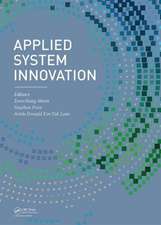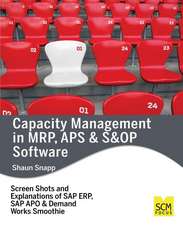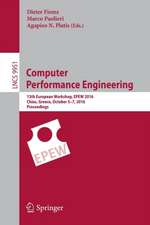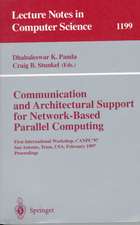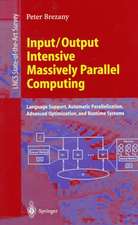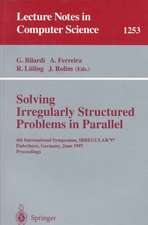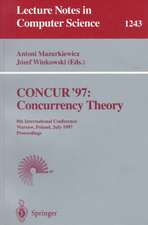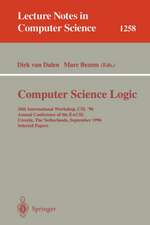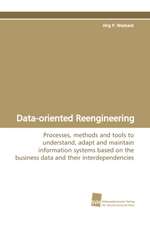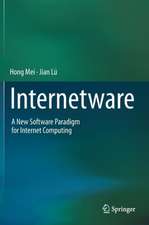Constructing the Infrastructure for the Knowledge Economy: Methods and Tools, Theory and Practice
Editat de Henry Linger, Julie Fisher, W. Gregory Wojtkowski, Wita Wojtkowski, Joze Zupancic, Kitty Vigo, Josie Arnolden Limba Engleză Paperback – 3 dec 2010
The purpose of these proceedings is to provide a forum for research and practice addressing current issues associated with Information Systems Development (ISD). ISD is undergoing dramatic transformation; every day, new technologies, applications, and methods raise the standards for the quality of systems expected by organizations as well as end users. All are becoming more dependent on the systems reliability, scalability, and performance. Thus, it is crucial to exchange ideas and experiences, and to stimulate exploration of new solutions. This proceedings provides a forum for just that, addressing both technical and organizational issues.
| Toate formatele și edițiile | Preț | Express |
|---|---|---|
| Paperback (1) | 1206.91 lei 38-44 zile | |
| Springer Us – 3 dec 2010 | 1206.91 lei 38-44 zile | |
| Hardback (1) | 1310.55 lei 43-57 zile | |
| Springer Us – 20 sep 2004 | 1310.55 lei 43-57 zile |
Preț: 1206.91 lei
Preț vechi: 1508.64 lei
-20% Nou
Puncte Express: 1810
Preț estimativ în valută:
230.95€ • 241.73$ • 192.22£
230.95€ • 241.73$ • 192.22£
Carte tipărită la comandă
Livrare economică 26 martie-01 aprilie
Preluare comenzi: 021 569.72.76
Specificații
ISBN-13: 9781441934598
ISBN-10: 1441934596
Pagini: 732
Ilustrații: XIV, 716 p.
Dimensiuni: 165 x 248 x 38 mm
Ediția:Softcover reprint of hardcover 1st ed. 2004
Editura: Springer Us
Colecția Springer
Locul publicării:New York, NY, United States
ISBN-10: 1441934596
Pagini: 732
Ilustrații: XIV, 716 p.
Dimensiuni: 165 x 248 x 38 mm
Ediția:Softcover reprint of hardcover 1st ed. 2004
Editura: Springer Us
Colecția Springer
Locul publicării:New York, NY, United States
Public țintă
ResearchCuprins
Keynotes.- 1. ISD Discourses and the Emancipation of Meaning.- 2. E-Documents as Tools for the Humanized Management of Community Knowledge.- 3. Enterprise Integration Using Enterprise Architecture.- Theoretical Foundations.- 4. The Formulation of Design Theories for Information Systems.- 5. Justifying ISD Knowledge Claims.- 6. The RO Theory, Discovery of BUI, and IS: Beginning of Theoretical Foundations.- 7. The Dynamics of an Information System in Light of Chaos Theory.- ISD Methods.- 8. Information Systems Development Methodologies in Practice.- 9. Software Development Methodology Evaluation Model.- 10. Representing Part-Whole Relations in Conceptual Modelling: A Comparison of Object-Oriented and Entity Relationship Modellers.- 11. Existence Dependency and Information Structure.- 12. Towards a Generic Model for Agile Processes.- 13. Continuous Integration as a Means of Coordination: A Case Study of Two Open Source Projects.- 14. On Business Rules Approach to the Information Systems Development.- 15. Business Functions Prototyping via XSLT.- 16. Old Trick, New Dogs: Learning to Use Crud Matrices Early in Object-Oriented Information System Development.- 17. From Vernacular to Rational Design in Software Engineering: Consequences of the Designer’s Changing Role.- Requirements for ISD.- 18. Picturing Problems.- 19. Using Cognitive Mapping for Problem Analysis in Information Requirements Determination.- 20. A Quality Model for the Evaluation of Software Requirements Specifications.- 21. A Qualitative Method for Identifying Factors That Influence User Satisfaction.- 22. Domain Model Driven Approach to Change Impact Assessment.- 23. Tracking Business Rules from Their Source to Their Implementation to Support is Maintenance.- 24. Process of Requirements Evolution inWeb-Enabled Employee Service Systems.- 25. Distributing Usability: The Implications for Usability Testing.- 26. Integrating Security Design into Information Systems Development.- 27. Integrating Security Properties with Systems Design Artefacts.- Knowledge Management.- 28. Knowledge Creation through Systems Development.- 29. From Philosophy to Knowledge Management and Back Again.- 30. Knowledge Management Strategies: Leaders and Leadership.- 31. Trust, Control, and Design: A Study of Computer Scientists.- 32. Building an Open Document Management System with Components for Trust.- 33. Knowledge Reuse in Project Management.- 34. Developing Knowledge Management Systems in BPM Context.- 35. Modelling Emergent Processes in Knowledge-Intensive Environments.- 36. Enabling Problem Domain Knowledge Transformation during Object Oriented Software Development.- Web and Internet Based Systems.- 37. Web Development: The Differences, Similarities and in-betweens.- 38. Searching for a Methodology for Smart Internet Technology Development.- 39. A Proposed Taxonomy of Media Collections and Its Implications for Design and Management of Multimedia Databases.- 40. XML Data Warehouse Possibilities and Solutions.- 41. “Web Presence”: Formulating a “Wicked” Research Problem.- 42. Automatic Topic Map Creation Using Term Crawling and Clustering Hierarchy Projection.- 43. Discovering WWW User Interface Problems via User Surveys and Log File Analysis.- 44. E-Government Services: One Local Government’s Approach.- 45. Web Auctions: An Impact Analysis for Baltic Region SMES.- 46. Experiences in Using a Web-Based GDSS to Coordinate Distributed Group Decision-Making Processes.- 47. Whispers from a Discourse: Digital Television in Australia.- Education.- 48. Walking the Walk of Eteaching andE-Learning: Enchancing Teaching and Learning Using the New Technologies.- 49. Effective Teaching of Groupware Development: A Conceptual Model.- 50. Application of System Engineering Methods in Information Systems Curricula Development.- Case Studies.- 51. Considerations in Systems Development of Applications for Mobile Devices: A Case Study.- 52. Outsourcing: An Information Systems Development Case Study in an Indonesian SME.- 53. Current Status and Trends in Customer Relationship Management: The Case of Slovenia.- 54. Information System Development for Demolition Material Management.- 55. A Distributed Logistic Support Communication System.




